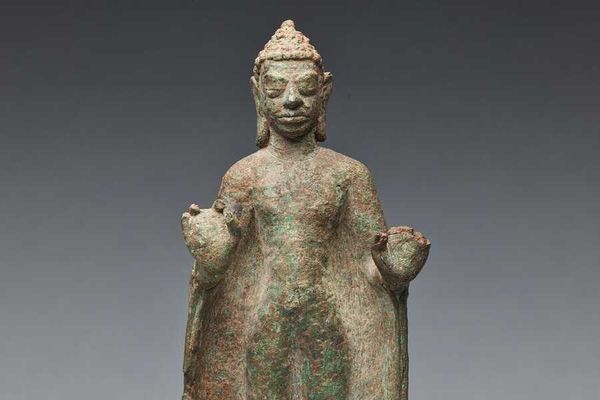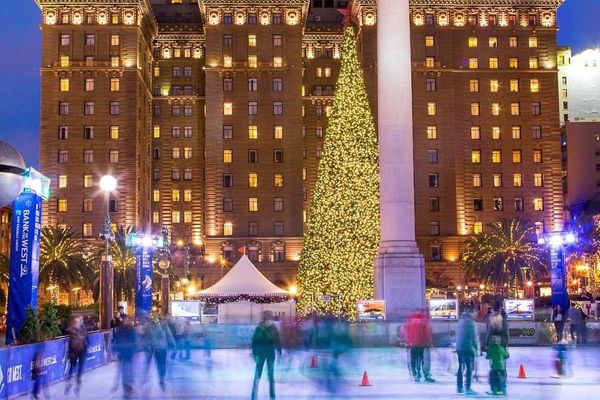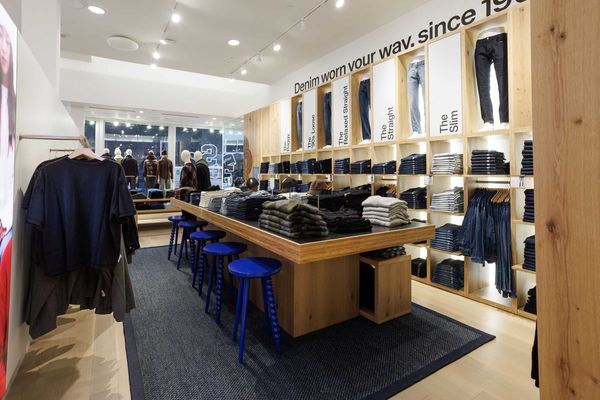When San Francisco's Rec & Park approved a Blue Bottle coffee cart (or more properly, a trailer) it set off howls of protest in the Mission district. Opponents have questioned what kind of impact it will have on existing businesses and nearby roasters. There have been angry meetings, and even angrier blog comments. We spoke to Blue Bottle founder and co-owner James Freeman to find out what all the ruckus was about.
7x7: How long have plans for the park location been in the works?
At least a year. I heard about the request for proposal (RFP) around a year ago. It took a long time to fill it out, get the insurance, and that kind of thing. It was a fairly arduous process. I heard about the RFP last summer, and the due date was November. We spent the last few weeks before it was due in a little bit of a scramble. We heard back that we’d been accepted to the next round in January. Then we had a taste-off at a panel in Golden Gate Park, in the county fair building.
7x7: And what’s the current status?
We have a trailer, we have employees, and we’ve got a few little details we have to finish on the trailer, and then I have to see how it’s all shaping up.
There was a meeting on Thursday. It was pretty contentious, there were raised voices and profanity. Not all of them, I have to say. But scattered among the people who were not interested in the trailer, there were raised voices. It was a contentious meeting. I was thinking there were many places I would rather be than in this room of 416 people. My mother-in-law was there. She was visiting from Southern California, and she was like “oh, this will be so interesting to go to a meeting at city hall.” A few hours later I was like, “oh, you poor woman.”
7x7: How much have you already invested in opening the site?
Just in buying equipment, not counting hours of training, it’s a solid 25 grand, which is actually pretty cheap. We got a good deal on a trailer in Turlock that one of our guys found on Craigslist. We’re about to replace the espresso machine in it. We found a truck in Santa Cruz. We did a pretty good job of being frugal. We’ve got four staff, they’ve been through three rounds of training, so somewhere between 100-200 labor hours.
7x7: I saw you estimated that you’ll be paying Rec & Park 20,000-30,000 per year, and $12,000 at a minimum. How did you arrive at that, and can you explain the deal a little? I think most people might expect that you would pay a flat monthly rent.
The structure of the proposal is that there’s a $1000 minimum monthly rent, and then we’re on the hook for 10 percent of revenue. So if were to make 50 grand a month, which is optimistic but not audacious, that would be $5,000. I don’t remember exactly, but it was between 30 [thousand] on the low side and 50 on the optimistic side.
This is where it gets interesting. One of the reasons I was attracted to the RFP to begin with is that Rec & Park was restructuring how they treated their vendors. Prior to this RFP, the structure was a brutally high 20-25 percent of revenue. Rent should only be 6 percent or so of revenue. At 20 percent, everyone gets paid minimum wage and you end up with low quality ingredients. That’s why vendors in the park right now are the way they are. This new proposal was a realization that a smaller piece of a bigger pie will benefit Rec & Park more, and will be a better representation of the food scene of San Francisco.
That’s why I was attracted to it. With my labor and ingredient costs, it would be foolish to do something that’s 25 percent of revenues. I’d spend more than I was making. When it came down to ten percent, that was still on the high side, but manageable. It was less expensive than building out a cafe. I said: I can afford a higher rent than I unusually could, and it will be this pilot program. It will be something good with good ingredients. I was envisioning a lot of my colleagues from the Ferry Plaza Farmer’s Market world being interested. I was proud to bring similar standards to the Ferry Plaza standards to San Francisco city parks. I thought it was a good idea, and we would be a pilot.
I’ve been wrong about a lot of things before, but I don’t think I’ve been so wrong about mis-gauging what I thought was a charming and innocuous idea.
7x7: Let’s talk about that. Were you expecting any pushback from the community at all or did this come as a complete surprise? Have you ever had resistance to an opening in a new location before?
No. No. Our first two locations were in pee smelling alleyways. I remember after we’d been open on Linden a couple of years, this condo was for sale that said “steps from Blue Bottle Coffee,” and I was like, “hey, we’re an amenity now!”
7x7: Some of the resistance seems to be that you’re not perceived as local--your roaster is in Oakland, you have operations in Brooklyn and sell nationally via the Web. Is that a fair criticism? What do you say to convince people you are a local?
We have four leases in San Francisco. We pay a whole lot of taxes in San Francisco. I’ve been married in city hall. I live up the street from San Francisco. A less good-natured and optimistic person than I might be cynical about the primary engineers of the dispute--who all seem to be in the coffee business. It’s not a secret that we roast coffee in Oakland. You can call us an Oakland business, a San Francisco business, a Brooklyn business. But I love San Francisco. That’s why I live here. That’s why I never want to leave.
And I should say, I don’t love San Francisco any less because of this. It’s easy to get bogged down but I don’t get bogged down in this. It is a fact: we have multiple locations, not all in San Francisco, and if that means we’re not local, then... We’re something else.
Have you seen the petitions? There are these online petitions being circulated. When I looked at one, they mentioned McDonald’s prior to mentioning Blue Bottle. If that’s where the discussion is; I’m powerless to say anything about it.
I’m disheartened by a lot of the tone of the conversation. I’ve been hearing rumors of... Rumors of people wanting to sabotage our generator and flatten our tires. It’s really disheartening. We wanted to come in and change the way food is in the parks, and we thought Dolores Park would be a great candidate for this kind of project.
7x7: Some of the criticism has revolved around the trailer itself. Why just a trailer in the Mission? Why not invest in a full-on storefront in the nature of downtown or Brooklyn, for that matter?
It’s very easy to ascribe otherness. I was talking to a friend of mine from Japan. His English is serviceable, but he spent a lot of his professional life in Japan, and literally I could not explain to him what the problem is. I couldn’t make him understand where the dispute was lying.
We have several cafes. The whole point of this, the reason I opened in Brooklyn, is that I don’t want to have a million cafes in San Francisco, but I still wanted to do something interesting. What I really wanted to do, by the way, is open in the back of a Ford Transit Connect.
One of the decisions that I made in terms of selecting a park, a lot of it is about traffic density. It’s a tough business, to pay two hours of labor on either end without selling any coffee. It’s tough to make that work, so you need to sell a lot of drinks. Where is the largest concentration of people? We were thinking of Dolores Park from the beginning. Almost everyone submitting the RFP was zeroing in on Dolores Park because of the weather, the community and the density of the park. We have a lot of existing customers there, and when word got out, we got a lot of feedback from people saying they thought it would be great.
Even though there are a fair number of people who sell coffee in that neighborhood, that neighborhood is so robust, I firmly believe local businesses aren’t going to sell one less latte. we’ve seen that in Hayes Valley. Local business come in selling coffee, and we’ve watched our sales go up not down.
7x7: Have you been in touch with any of the other, more established businesses that border the park, such as Dolores Park Cafe?
We had a conversation with one of the owners at Dolores Park Church. We had a conversation after the first meeting. Our manager Mike Hamm talked to the gentleman that does Faye’s Video and Coffee. The conversations have been respectful.
7x7: Let’s move on to some of your more concrete plans. Can you tell me about what the trailer itself will look like and where it will be in the park?
One issue is the language. A pushcart was an unfortunate term, and unfortunately in the minds of people not used to dealing with the health department it conjured up images of the popsicle guy. My 8x12 trailer gets called a pushcart, which in the eyes of the health department it is. If people are expecting a pushcart, well... I have a certain sympathy when they weren’t expecting the scale.
If you’re going to follow the rules for mobile vending, you’re required to have certain things. [Freeman cites a laundry list of uninteresting health department requirements]. All of those things add up to a larger piece of equipment than people would really prefer.
It’s about the size of a horse trailer. It’s clad in shiny aluminum. It has two windows that flip up with an awning. The truck will not be parking in the park, just the trailer. It’s not an Airstream, it’s retro, but I think the time for Airstreams have come and gone.
7x7: What will it serve, when will it be open, and how many people will it employ?
We’ve got four full timers, and will fill in with existing staff and managers depending on how busy it is. We’ll serve coffee and espresso drinks. We’ve got baked foods. Espresso, macchiato, cappuccino, latte, brewed coffee, and New Orleans iced coffee. No sizes, no flavors.
7x7: Gibraltar?
If requested.
7x7: What can you tell me about the espresso machine, which I saw you described as red and jaunty? It sounds like something out of J-Crew...
It’s a three group lever machine powered by propane. It’s the same machine--we have a four group machine like that at our trailer at the Ferry Plaza farmer’s market. It’s propane powered, which is a more rustic form of operation but we’ve got a lot of experience with it.
There’s a small amount of electricity needed. But instead of a heating element inside the water, it’s almost like if you have a gas barbecue, a little pipe with flames coming out that are underneath the broiler. The lever doesn’t take any electricity at all. It’s a big spring that gets compressed and pushes through the pocket at the proper temperature.
7x7: Is it hard to keep the temperature correct?
It’s a bigger dead band. But the levers are kind of cool because it’s the original pressure profiling machine. You’ve heard of the Slayer, I’m sure. The lever is the original pressure profiling machine. The pressure goes up very quickly then tapers away in a bell shape curve that can be very good for the coffee.
I love levers. We have a La San Marco lever, a vintage one from the 70s, a one group lever, in Mint Plaza and a two group lever in our shop in Brooklyn. And that is the most expensive $200 espresso machine in the world--just because we spent so much money fixing it up. But then, oh, they’re really, really great.
Mat Honan writes about San Francisco coffee culture for 7x7 every Wednesday, except when he doesn't.



















